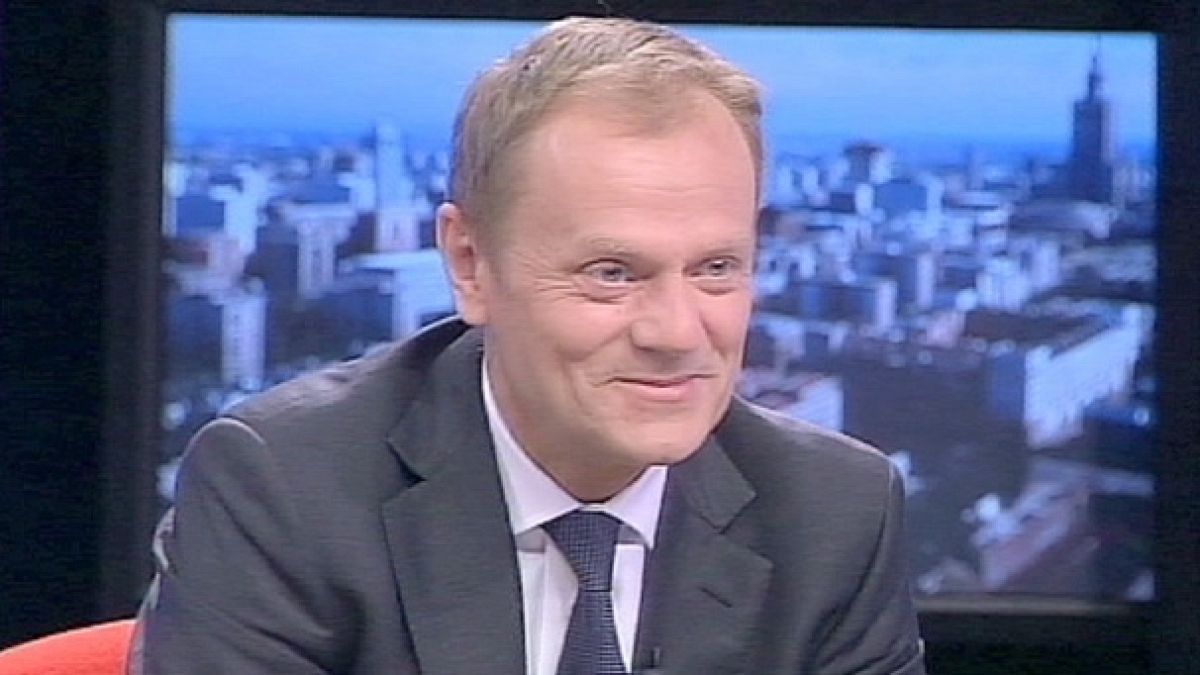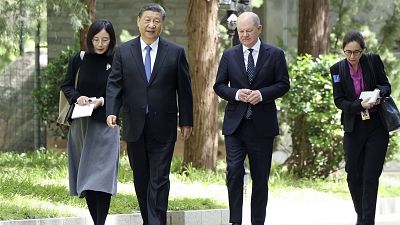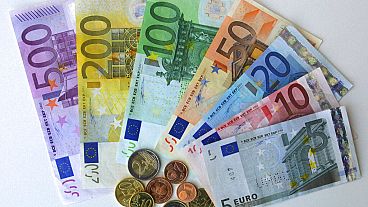For the next six months Poland will hold the presidency of the European Union. Their priorities include strengthening cohesion and cooperation in Central Europe. euronews met the Polish prime minister Donald Tusk to find out more.
euronews: “Prime minister Tusk, your country will take over the presidency of the European Union, but it is a difficult time because there are political problems in terms of consensus for the European Union among its citizens. How do you think you will tackle this growing euroscepticism around Europe?”
Donald Tusk: “The European Union is not only useful during easy times, it has to prove itself useful in difficult times too and this is the first task of the Polish presidency, to strengthen faith in Europe to match Polish faith.”
euronews: “There are countries that would like to lower the budget of the European Union because they say that they are spending too much. What do you think, is this also an example of growing euroscepticism?
Donald Tusk: “Are the investments in motorways, highways, climate protection, and other investments from the European budget, the cause of the crisis? We know they are not. I would also like to underline the fact that the European budget, compared to national budgets in recent years is not increasing, but decreasing. Nowadays nobody with common sense would ask for a radical spending increase. We all need to reduce public spending, but if the victim of the financial crisis was to be the common European policy and the European budget, that would be the most serious mistake that the European Union could make.”
euronews: “Prime minister, I’m not only talking about the cohesion policy and the budget but also about the countries that are bailing out other countries of the European Union for the euro crisis, in this case it is not a matter of cohesion policy. What do you think about this criticism coming from those people who have the sentiment that they are paying taxes for others?”
Donald Tusk: “I would not differentiate between the duties of, for example, the Germans and the Greeks. We all have the same duty, which is not to waste public money, as they already have in some southern member states, and also not to resent the European Union, because in the common market of the EU the rich countries make big profits.”
euronews: “Sooner or later Poland will adopt the euro. But the Polish people don’t seem keen to adopt the single currency. What about your government? What is the opinion of your government?”
Donald Tusk: “We took this decision a long time ago and we take it very seriously in Poland. Accession to the EU, the treaties we signed, mean that Poland will join the euro zone. We want to adopt the single currency as soon as possible. The truth is that today the enthusiasm of some people for the euro has decreased but this is due to the economic crisis in the euro zone and not a change in the way Poles think.”
euronews: “So you are justifying the fears of your citizens by saying it is due to the approach that some member states of the euro zone have vis-a-vis the single currency.”
Donald Tusk: “We, in Poland will do what we have to do in our march towards the euro zone. I think that moods are moods, but there are concrete criteria…”
euronews: “But the single currency is unpopular in Poland, isn’t it? They see what is going on in the euro zone.”
Donald Tusk: “No, no, we have always underlined that the decision will be taken when Poland fulfils all the Maastricht criteria. Some have said that Poland, with its good economic and financial situation, could take a short cut to the euro, but we believe that to enter the euro zone in a responsible way, Poland has to fulfil all the Maastricht criteria and that is when we will take the decision. Believe me, if there is less enthusiasm than before, it’s still enough for Poland to join the euro zone.”
euronews: “Most of the troubles within the common foreign and security policy are coming from the Middle East with this Arabic uprising and the European Union is not able to find a common position to face this situation. So what proposals will you put on the table?”
Donald Tusk: “At the meeting in Paris, when European intervention in Libya started, I asked myself: how real are the differences between the EU states and do they exist at all? I believe the situation is not as bad as is seen by some people from the outside.
euronews: “Sorry Prime Minister but the Germans were quite reluctant to enter the war with Libya, while the French and the British were already starting to attack. And nobody knew what the Italians wanted in this situation, just that they were not happy about it. So this was a big problem because the European Union was unable to express a single position because of divisions among the member states.”
Donald Tusk: “The fact is that the French and the British are leading this military engagement but there are other partners involved too. That is why I believe that the political behaviour of Europe was good, considering previous experiences. We have to take into account that we do not have common military and administrative rules, so in the future European security policy must be better organised, integrated, and regulated. Then we won’t hear so many annoying discussions and debates on how much each country can give.”
euronews: “What do you think about the European Union’s policy on Russia? Is it coherent? Or is Russia another issue that divides European countries?”
Donald Tusk: “It is good that our conversation comes at a time when we are also finalising very difficult negotiations here in Brussels, to allow Russian citizens to travel in and out of the Kaliningrad enclave without visas. This was a Polish initiative and it is another step towards normalising Polish-Russian relations. I believe that Poland, with its experience and thanks to my government’s approach in recent years which has been building good relations with Russia… thanks to all that Europe is on the road to a coherent, cohesive and consistent policy on Russia, without radical changes.”



